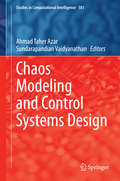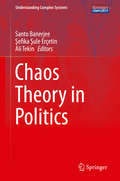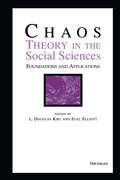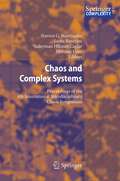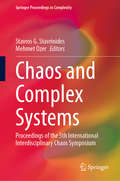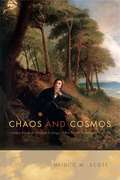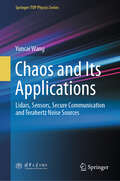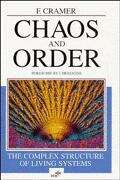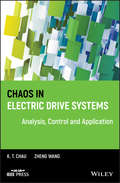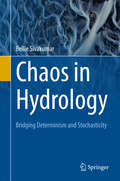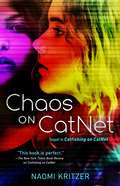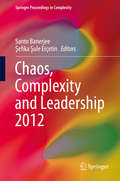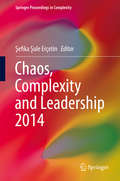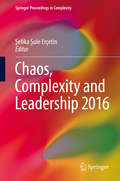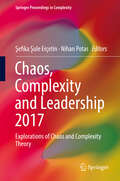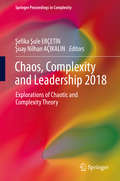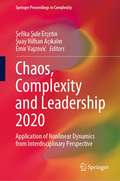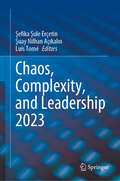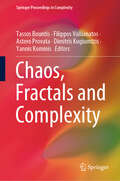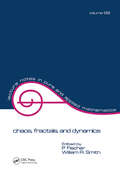- Table View
- List View
Chaos Modeling and Control Systems Design (Studies in Computational Intelligence #581)
by Ahmad Taher Azar Sundarapandian VaidyanathanThe development of computational intelligence (CI) systems was inspired by observable and imitable aspects of intelligent activity of human being and nature. The essence of the systems based on computational intelligence is to process and interpret data of various nature so that that CI is strictly connected with the increase of available data as well as capabilities of their processing, mutually supportive factors. Developed theories of computational intelligence were quickly applied in many fields of engineering, data analysis, forecasting, biomedicine and others. They are used in images and sounds processing and identifying, signals processing, multidimensional data visualization, steering of objects, analysis of lexicographic data, requesting systems in banking, diagnostic systems, expert systems and many other practical implementations. This book consists of 15 contributed chapters by subject experts who are specialized in the various topics addressed in this book. The special chapters have been brought out in the broad areas of Control Systems, Power Electronics, Computer Science, Information Technology, modeling and engineering applications. Special importance was given to chapters offering practical solutions and novel methods for the recent research problems in the main areas of this book, viz. Control Systems, Modeling, Computer Science, IT and engineering applications. This book will serve as a reference book for graduate students and researchers with a basic knowledge of control theory, computer science and soft-computing techniques. The resulting design procedures are emphasized using Matlab/Simulink software.
Chaos Theory (Bullet guides)
by Ron Poet David PoetOpen this book and you will <P><P>Discover the origins of chaos theory <P>Investigate complex systems<P>Understand the causes of chaos<P> Become aware of its everyday implications
Chaos Theory in Politics (Understanding Complex Systems)
by Santo Banerjee Şefika Şule Erçetin Ali TekinThe present work investigates global politics and political implications of social science and management with the aid of the latest complexity and chaos theories. Until now, deterministic chaos and nonlinear analysis have not been a focal point in this area of research. This book remedies this deficiency by utilizing these methods in the analysis of the subject matter. The authors provide the reader a detailed analysis on politics and its associated applications with the help of chaos theory, in a single edited volume.
Chaos Theory in the Social Sciences
by L. Douglas Kiel Euel ElliottChaos Theory in the Social Sciences: Foundations and Applicationsoffers the most recent thinking in applying the chaos paradigm to the social sciences. The book explores the methodological techniques--and their difficulties--for determining whether chaotic processes may in fact exist in a particular instance and examines implications of chaos theory when applied specifically to political science, economics, and sociology. The contributors to the book show that no single technique can be used to diagnose and describe all chaotic processes and identify the strengths and limitations of a variety of approaches. The essays in this volume consider the application of chaos theory to such diverse phenomena as public opinion, the behavior of states in the international arena, the development of rational economic expectations, and long waves. Contributors include Brian J. L. Berry, Thad Brown, Kenyon B. DeGreene, Dimitrios Dendrinos, Euel Elliott, David Harvey, L. Ted Jaditz, Douglas Kiel, Heja Kim, Michael McBurnett, Michael Reed, Diana Richards, J. Barkley Rosser, Jr. , and Alvin M. Saperstein. L. Douglas Kiel and Euel W. Elliott are both Associate Professors of Government, Politics, and Political Economy, University of Texas at Dallas.
Chaos Theory: Bullet Guides
by Dr Ron PoetOpen this book and you will Discover the origins of chaos theory Investigate complex systems Understand the causes of chaos Become aware of its everyday implications
Chaos and Complex Systems: Proceedings of the 4th International Interdisciplinary Chaos Symposium (Understanding Complex Systems)
by Santo Banerjee Mehmet Ozer Stavros G. Stavrinides Suleyman Hikmet CaglarComplexity Science and Chaos Theory are fascinating areas of scientific research with wide-ranging applications. The interdisciplinary nature and ubiquity of complexity and chaos are features that provides scientists with a motivation to pursue general theoretical tools and frameworks. Complex systems give rise to emergent behaviors, which in turn produce novel and interesting phenomena in science, engineering, as well as in the socio-economic sciences. The aim of all Symposia on Chaos and Complex Systems (CCS) is to bring together scientists, engineers, economists and social scientists, and to discuss the latest insights and results obtained in the area of corresponding nonlinear-system complex (chaotic) behavior. Especially for the "4th International Interdisciplinary Chaos Symposium on Chaos and Complex Systems," which took place April 29th to May 2nd, 2012 in Antalya, Turkey, the scope of the symposium had been further enlarged so as to encompass the presentation of work from circuits to econophysics, and from nonlinear analysis to the history of chaos theory. The corresponding proceedings collected in this volume address a broad spectrum of contemporary topics, including but not limited to networks, circuits, systems, biology, evolution and ecology, nonlinear dynamics and pattern formation, as well as neural, psychological, psycho-social, socio-economic, management complexity and global systems.
Chaos and Complex Systems: Proceedings of the 5th International Interdisciplinary Chaos Symposium (Springer Proceedings in Complexity)
by Mehmet Ozer Stavros G. StavrinidesThis book presents the proceedings of the “5th International Interdisciplinary Chaos Symposium on Chaos and Complex Systems (CCS).” All Symposia in the series bring together scientists, engineers, economists and social scientists, creating a vivid forum for discussions on the latest insights and findings obtained in the areas of complexity, nonlinear dynamics and chaos theory, as well as their interdisciplinary applications. The scope of the latest Symposium was enriched with a variety of contemporary, interdisciplinary topics, including but not limited to: fundamental theory of nonlinear dynamics, networks, circuits, systems, biology, evolution and ecology, fractals and pattern formation, nonlinear time series analysis, neural networks, sociophysics and econophysics, complexity management and global systems.
Chaos and Complexity in Psychology
by Stephen J. Guastello Matthijs Koopmans David Pincus Stephen J. Guastello Matthijs KoopmansWhile many books have discussed methodological advances in nonlinear dynamical systems theory (NDS), this volume is unique in its focus on NDS's role in the development of psychological theory. After an introductory chapter covering the fundamentals of chaos, complexity, and other nonlinear dynamics, subsequent chapters provide in-depth coverage of each of the specific topic areas in psychology. A concluding chapter takes stock of the field as a whole, evaluating important challenges for the immediate future. The chapters are written by experts in the use of NDS in each of their respective areas, including biological, cognitive, developmental, social, organizational, and clinical psychology. Each chapter provides an in-depth examination of theoretical foundations and specific applications and a review of relevant methods. This edited collection represents the state of the art in NDS science across the disciplines of psychology.
Chaos and Cosmos: Literary Roots of Modern Ecology in the British Nineteenth Century
by Heidi C. ScottIn Chaos and Cosmos, Heidi Scott integrates literary readings with contemporary ecological methods to investigate two essential and contrasting paradigms of nature that scientific ecology continues to debate: chaos and balance. Ecological literature of the Romantic and Victorian eras uses environmental chaos and the figure of the balanced microcosm as tropes essential to understanding natural patterns, and these eras were the first to reflect upon the ecological degradations of the Industrial Revolution. Chaos and Cosmos contends that the seed of imagination that would enable a scientist to study a lake as a microcosmic world at the formal, empirical level was sown by Romantic and Victorian poets who consciously drew a sphere around their perceptions in order to make sense of spots of time and place amid the globalizing modern world. This study’s interest goes beyond likening literary tropes to scientific aesthetics; it aims to theorize the interdisciplinary history of the concepts that underlie our scientific understanding of modern nature. Paradigmatic ecological ideas such as ecosystems, succession dynamics, punctuated equilibrium, and climate change are shown to have a literary foundation that preceded their status as theories in science. This book represents an elevation of the prospects of ecocriticism toward fully developed interdisciplinary potentials of literary ecology.
Chaos and Cosmos: Literary Roots of Modern Ecology in the British Nineteenth Century
by Heidi C. ScottIn Chaos and Cosmos, Heidi Scott integrates literary readings with contemporary ecological methods to investigate two essential and contrasting paradigms of nature that scientific ecology continues to debate: chaos and balance. Ecological literature of the Romantic and Victorian eras uses environmental chaos and the figure of the balanced microcosm as tropes essential to understanding natural patterns, and these eras were the first to reflect upon the ecological degradations of the Industrial Revolution. Chaos and Cosmos contends that the seed of imagination that would enable a scientist to study a lake as a microcosmic world at the formal, empirical level was sown by Romantic and Victorian poets who consciously drew a sphere around their perceptions in order to make sense of spots of time and place amid the globalizing modern world. This study’s interest goes beyond likening literary tropes to scientific aesthetics; it aims to theorize the interdisciplinary history of the concepts that underlie our scientific understanding of modern nature. Paradigmatic ecological ideas such as ecosystems, succession dynamics, punctuated equilibrium, and climate change are shown to have a literary foundation that preceded their status as theories in science. This book represents an elevation of the prospects of ecocriticism toward fully developed interdisciplinary potentials of literary ecology.
Chaos and Its Applications: Lidars, Sensors, Secure Communication and Terahertz Noise Sources (Springer-TUP Physics Series)
by Yuncai WangThis book highlights the applications of optoelectronic chaotic signals in various fields, including lidars/radars, sensors, secure communication, and millimeter/terahertz noise generation. It covers the following topics: - In lidar/radar detection, the book discusses chaotic lidars, chaotic through-wall life detection radars, and chaotic ground penetrating radars. - Regarding optical fiber measurement and sensing, it provides a detailed examination of chaotic time-domain reflection measurement and chaotic distributed fiber sensing technologies. - In the realm of secure communication, the book reviews optical chaos synchronization, chaotic secure optical communication, physical random number generators, and secure key distribution based on chaotic synchronization. - For noise generation, it summarizes the millimeter/terahertz noise generation mechanism and noise source prototypes that utilize photo-mixing chaotic lights. This book is a valuable resource for professionals, educators, graduate students, and advanced undergraduates involved in fields such as radar detection, laser technology, fiber optic sensing, optical communication, and testing and measurement technology and instruments.
Chaos and Order: The Complex Structure of Living Systems
by Friedrich CramerMolecular biologist Cramer explores how recent revelations about nonlinear systems enhance our perceptions of nature. Each chapter begins with a semi-fictitious dialogue and ends with a poem by the likes of Yeats, Dickinson, and Stevens. Of interest to specialist and nonspecialist scientists and to general readers who are basically familiar with scientific principles.
Chaos in Dynamical Systems
by Edward OttIn the new edition of this classic textbook Ed Ott has added much new material and has significantly increased the number of homework problems. The most important change is the addition of a completely new chapter on control and synchronization of chaos. Other changes include new material on riddled basins of attraction, phase locking of globally coupled oscillators, fractal aspects of fluid advection by Lagrangian chaotic flows, magnetic dynamos, and strange nonchaotic attractors.
Chaos in Electric Drive Systems: Analysis, Control and Application (Wiley - IEEE)
by Zheng Wang K. T. ChauIn Chaos in Electric Drive Systems: Analysis, Control and Application authors Chau and Wang systematically introduce an emerging technology of electrical engineering that bridges abstract chaos theory and practical electric drives. The authors consolidate all important information in this interdisciplinary technology, including the fundamental concepts, mathematical modeling, theoretical analysis, computer simulation, and hardware implementation. The book provides comprehensive coverage of chaos in electric drive systems with three main parts: analysis, control and application. Corresponding drive systems range from the simplest to the latest types: DC, induction, synchronous reluctance, switched reluctance, and permanent magnet brushless drives. The first book to comprehensively treat chaos in electric drive systems Reviews chaos in various electrical engineering technologies and drive systems Presents innovative approaches to stabilize and stimulate chaos in typical drives Discusses practical application of chaos stabilization, chaotic modulation and chaotic motion Authored by well-known scientists in the field Lecture materials available from the book's companion website This book is ideal for researchers and graduate students who specialize in electric drives, mechatronics, and electric machinery, as well as those enrolled in classes covering advanced topics in electric drives and control. Engineers and product designers in industrial electronics, consumer electronics, electric appliances and electric vehicles will also find this book helpful in applying these emerging techniques. Lecture materials for instructors available at www.wiley.com/go/chau_chaos
Chaos in Hydrology: Bridging Determinism and Stochasticity
by Bellie SivakumarThis authoritative book presents a comprehensive account of the essential roles of nonlinear dynamic and chaos theories in understanding, modeling, and forecasting hydrologic systems. This is done through a systematic presentation of: (1) information on the salient characteristics of hydrologic systems and on the existing theories for their modeling; (2) the fundamentals of nonlinear dynamic and chaos theories, methods for chaos identification and prediction, and associated issues; (3) a review of the applications of chaos theory in hydrology; and (4) the scope and potential directions for the future. This book bridges the divide between the deterministic and the stochastic schools in hydrology, and is well suited as a textbook for hydrology courses.
Chaos on CatNet: Sequel to Catfishing on CatNet (A CatNet Novel #2)
by Naomi Kritzer“This book is perfect.”—The New York Times Book Review on Catfishing on CatNetIt takes an AI to catch an AI in Chaos on CatNet, the follow-up to Naomi Kritzer's award-winning near future YA thriller.When a mysterious entity starts hacking into social networks and chat rooms to instigate paranoia and violence in the real world, it’s up to Steph and her new friend, Nell, to find a way to stop it—with the help of their benevolent AI friend, CheshireCat.Praise for Catfishing on CatNetA New York Times Book Review Editors’ Choice/Staff PickA Kirkus Reviews Best BookA Junior Library Guild SelectionAn Edgar Award Winner for Best Young Adult NovelA Minnesota Book Award Winner for Best Young Adult NovelAn Andre Norton Nebula Award FinalistAn ITW Thriller Award for Best YA Novel NomineeA Lodestar Award Winner for Best Young Adult Book Midwest Connections Pick (Midwest Independent Booksellers Association) “A first-rate YA novel.”—Locus Magazine“Positive, realistic LGBTQIA+ representation—especially nonbinary identities. Wickedly funny and thrilling in turns; perfect for readers coming-of-age online.”—Kirkus (starred review)At the Publisher's request, this title is being sold without Digital Rights Management Software (DRM) applied.
Chaos, Complexity and Leadership 2013 (Springer Proceedings in Complexity)
by Santo Banerjee Şefika Şule ErçetinThese proceedings from the 2013 symposium on "Chaos, complexity and leadership" reflect current research results from all branches of Chaos, Complex Systems and their applications in Management. Included are the diverse results in the fields of applied nonlinear methods, modeling of data and simulations, as well as theoretical achievements of Chaos and Complex Systems. Also highlighted are Leadership and Management applications of Chaos and Complexity Theory.
Chaos, Complexity and Leadership 2014 (Springer Proceedings in Complexity)
by Şefika Şule ErçetinThis work represents the third entry of the series of works on "Chaos, Complexity and Leadership". Contents of the book are composed from broad range of chaos, complexity and their applications in multi disciplines. Articles reflect different perspectives in the field of applied nonlinear methods, modeling of data and simulations as well as theoretical achievements of chaos and complex systems. In addition to this, readers are going to find new applications in leadership and management of chaos and complexity theory such as in fields from education to politics. It is completely new and fresh piece of mind for readers who are interested in chaos, complexity and especially leadership.
Chaos, Complexity and Leadership 2016
by Şefika Şule ErçetinThis book covers the proceedings from the 2016 International Symposium on Chaos, Complexity and Leadership, and reflects current research results of chaos and complexity studies and their applications in various fields. Included are research papers in the fields of applied nonlinear methods, modeling of data and simulations, as well as theoretical achievements of chaos and complex systems. Also discussed are leadership and management applications of chaos and complexity theory.
Chaos, Complexity and Leadership 2017: Explorations Of Chaos And Complexity Theory (Springer Proceedings in Complexity)
by Şefika Şule Erçetin Nihan PotasThe proceedings of the 2017 Symposium on Chaos, Complexity and Leadership illuminate current research results and academic work from the fields of physics, mathematics, education, economics, as well as management and social sciences. The text explores chaotic and complex systems, as well as chaos and complexity theory in view of their applicability to management and leadership.This proceedings explores non-linearity as well as data-modelling and simulation in order to uncover new approaches and perspectives. Effort will not be spared in bringing theory into practice while exploring leadership and management-laden concepts. This book will cover the analysis of different chaotic developments from different fields within the concepts of chaos and complexity theory. Researchers and students in the field will find answers to questions surrounding these intertwined and compelling fields.
Chaos, Complexity and Leadership 2018: Explorations of Chaotic and Complexity Theory (Springer Proceedings in Complexity)
by Şefika Şule Erçeti̇n Şuay Nilhan AçikalinThis book constitutes the proceedings of the 6th International Symposium on Chaos, Complexity and Leadership (ICCLS). Written by interdisciplinary researchers and students from the fields of mathematics, physics, education, economics, political science, statistics, the management sciences and social sciences, the peer-reviewed contributions explore chaotic and complex systems, as well as chaos and complexity theory in the context of their applicability to management and leadership. The book discusses current topics, such as complexity leadership in the healthcare fields and tourism industry, conflict management and organization intelligence, and presents practical applications of theoretical concepts, making it a valuable resource for managers and leaders.
Chaos, Complexity and Leadership 2020: Application of Nonlinear Dynamics from Interdisciplinary Perspective (Springer Proceedings in Complexity)
by Şefika Şule Erçetin Şuay Nilhan Açıkalın Emir VajzovićThis book analyzes a range of new developments in various fields concerning the concepts of chaos and complexity theory. The proceedings of the 7th International Symposium on Chaos, Complexity and Leadership feature newly developed concepts involving various research methodologies for identifying chaos and complexity in different fields of the sciences and leadership. In addition, it explores chaotic and complex systems from all fields of knowledge in order to stake a claim of prevalence of compatibility between knowledge fields. Particular emphasis is placed on exploring non-linearity in order to open a discussion on new approaches to and perspectives on chaos, complexity and leadership. Readers will find coverage of important events that have recently taken place in our world, regardless of whether they were social, political, economic or scientific in nature. The book explores diverse aspects of and issues related to the effects of chaos and complexity in the world; discusses the application of nonlinear dynamics in order to arrive at transformational policies; and offers projections of tomorrow’s world using an interdisciplinary approach. Though primarily intended for readers with an interest in nonlinear science, thanks to its focus on the application of chaos and complexity to other disciplines, the book appeals to a broad readership.
Chaos, Complexity, and Leadership 2023
by Şefika Şule Erçetin Şuay Nilhan Açıkalın Luís ToméThe proceedings of the 8th International Symposium on Chaos, Complexity, and Leadership present various concepts of diverse research methodologies to explore chaos and complexity across different scientific fields of leadership. Particular emphasis will be placed on investigating non-linearity to stimulate discussion on novel approaches and perspectives regarding chaos, complexity, and leadership. The book delves into recent developments from diverse fields, employing chaos and complexity theory as analytical tools. Readers will find insights into important contemporary events, regardless of the various perspectives across social, political, economic, or scientific domains. It integrates numerous aspects and challenges regarding the impact of chaos and complexity on our world, utilizing nonlinear dynamics to suggest transformative policies. It aims to investigate and predict future paths through an interdisciplinary approach. Given the current societal and economic turbulence, leadership across all sectors necessitates reassessment. Consequently, this book primarily targets individuals interested in nonlinear science and leadership. However, its content extends its appeal to a broader audience due to its application of chaos and complexity to other disciplines. The primary audience comprises academics, professionals, and decision-makers seeking to implement new approaches and methodologies in practice.
Chaos, Fractals and Complexity (Springer Proceedings in Complexity)
by Tassos Bountis Filippos Vallianatos Astero Provata Dimitris Kugiumtzis Yannis KominisThis volume of proceedings contains research results within the framework of the fields of Chaos, Fractals and Complexity, written by experienced professors, young researchers, and applied scientists. It includes reviews of the fields, which are presented in an educational way for the widest possible audience, analytical results, computer simulations and experimental evidence, focusing on mathematical modelling. The papers presented here are selected from lectures given at the 28th Summer School “Dynamical Systems and Complexity”, July 18 – 27, 2022. Topics cover applications of complex systems in Neuroscience, Biology, Photonics, Seismology, Meteorology, and more broadly Physical and Engineering systems. The summer school has a long history, which began at the University of Patras in 1987 and continues with great success to this day. The original main purpose was to introduce young students and researchers of Greece to a new science that emerged several decades ago and continues to grow internationally at an ever increasing rate around the world.
Chaos, Fractals, and Dynamics
by P. FischerThis book contains eighteen papers, all more-or-less linked to the theory of dynamical systems together with related studies of chaos and fractals. It shows many fractal configurations that were generated by computer calculations of underlying two-dimensional maps.
